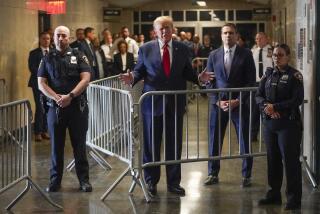Start of Silberman Trial Is Postponed 2 Weeks : Courts: A judge said the businessman needs the time he lost while recovering from a suicide attempt to prepare his defense in the money-laundering case.
- Share via
A federal judge Monday postponed the start of Richard T. Silberman’s trial on money-laundering charges until April 25, saying it was only fair to give the prominent businessman two extra weeks to prepare.
Silberman, 60, a top aide to former Gov. Edmund G. Brown Jr., needed the time to make up the two weeks he lost while recovering from a February suicide attempt, U.S. District Judge J. Lawrence Irving ruled, granting a defense request to push back the start of the trial from April 10.
In other matters at Monday’s hearing, Irving put off until April 10 a hearing on a defense request to move the trial to Los Angeles. The judge also said he needed time to consider a defense claim that the case should be dismissed because of “outrageous” government conduct in the use of an allegedly violent and untrustworthy informant.
Silberman, who appeared in court for the first time since he tried to kill himself in a Las Vegas hotel room, held hands throughout the hearing with his wife, San Diego County Supervisor Susan Golding. He declined to comment afterward.
Silberman, reputed mobster Chris Petti and three other men are accused of laundering $300,000 that an undercover FBI agent characterized as the proceeds of Colombian drug trafficking.
Petti and the three others are scheduled to be tried July 17.
On Feb. 15, Silberman disappeared from San Diego. He was found two days later, unconscious, in the hotel room. After writing a suicide note, he tried to kill himself with an overdose of sleeping pills, Golding said.
Immediately after being released from a Las Vegas hospital, Silberman checked into a San Francisco psychiatric clinic. He returned to San Diego early this month.
Silberman’s San Francisco-based lawyers contend that he can’t get a fair trial in San Diego because there has been so much publicity about the case since he was arrested April 7, 1989, in a Mission Bay hotel room.
The original purpose of Monday’s hearing was to consider the defense contention that a key government informant, Robert Benjamin, had such a lengthy history of threats and violence that it required the dismissal of the case.
It was through Benjamin, a convicted felon who had become a cooperating witness for the FBI, that Silberman met the undercover FBI agent, according to prosecutors.
Defense attorney James J. Brosnahan said at Monday’s hearing that Benjamin’s record of violence dates to 1969. To use a “psychotic, schizophrenic (and) dangerous” informant against Silberman, who had no criminal record, was a grave error requiring the dismissal of the entire case against Silberman, Brosnahan said.
Assistant U.S. Atty. Charles F. Gorder said Brosnahan’s claims were largely “wild allegations” that were based on claims from Benjamin’s ex-wife and stepson. Prosecutors believe that neither is particularly credible, Gorder said.
Irving said he could not rule on the issue because both Brosnahan and Gorder had given him material on Benjamin to review shortly before the hearing, and he needed time to look at it.
In a series of rulings over the past month, Irving rejected every significant defense effort to strike any of the seven counts against Silberman.
More to Read
Sign up for Essential California
The most important California stories and recommendations in your inbox every morning.
You may occasionally receive promotional content from the Los Angeles Times.













